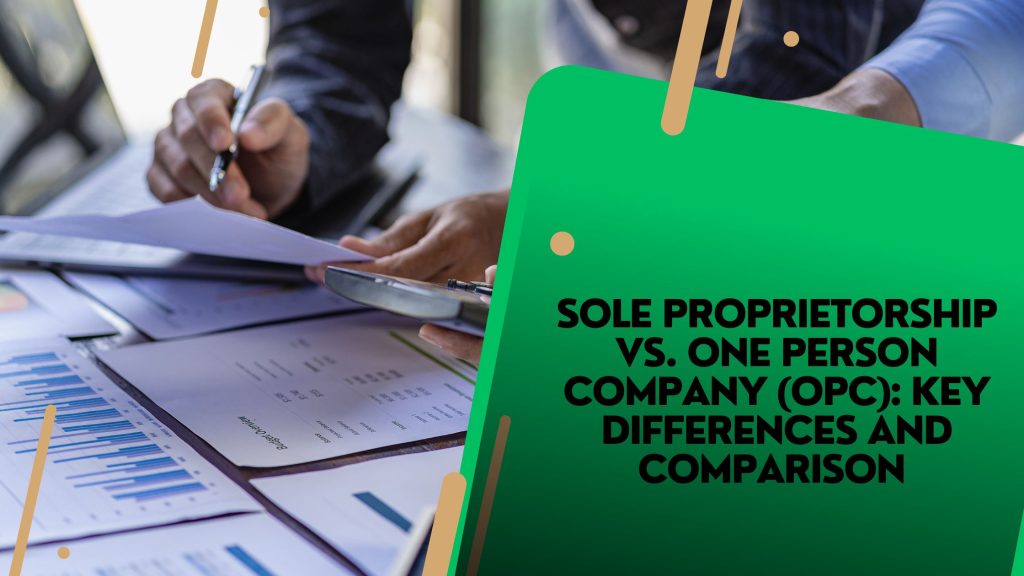Starting a business requires choosing the right legal structure, and for individuals looking to operate independently, Sole Proprietorship and One Person Company (OPC) are two common options. While both are designed for single owners, they have significant differences in terms of liability, registration, compliance, and long-term growth potential. This article explores the distinctions between these two business structures to help entrepreneurs make an informed decision.
Definition and Legal Structure
- Sole Proprietorship: This is an unregistered business owned and managed by a single individual. It is the simplest form of business, where the owner assumes full control and is personally responsible for all debts and liabilities.
- One Person Company (OPC): Introduced under the Companies Act, 2013, an OPC is a registered business entity that allows an individual to operate as a company. It provides limited liability protection, meaning the owner’s personal assets remain separate from business liabilities.
Ownership and Liability
- Sole Proprietorship: The owner has complete ownership but also bears unlimited liability, meaning personal assets can be used to settle business debts.
- One Person Company: The individual acts as both the sole shareholder and director while enjoying limited liability, protecting personal assets from business risks.
Registration and Compliance
- Sole Proprietorship:
- Requires minimal paperwork and no formal registration.
- Operates under the owner’s name or a chosen trade name.
- Necessary licenses and tax registrations must be obtained as per local laws.
- One Person Company:
- Requires formal registration with the Registrar of Companies (RoC).
- Involves submitting the Memorandum of Association (MoA) and Articles of Association (AoA).
- Must comply with regulatory filings, including annual financial statements and audits.
Business Continuity and Transferability
- Sole Proprietorship: Since the business is directly linked to the owner, it ceases to exist upon their demise or decision to close the business.
- One Person Company: OPCs enjoy perpetual existence, meaning they continue to operate even if the owner passes away. Ownership can be transferred through succession or by selling shares.
Fundraising and Growth Potential
- Sole Proprietorship: Raising funds can be difficult since the business relies on personal savings or bank loans. External investors may be hesitant due to unlimited liability concerns.
- One Person Company: OPCs have better opportunities for expansion. They can raise capital by issuing shares and attract investments, making them more scalable for long-term growth.
Conclusion
Choosing between a sole proprietorship and a one person company (OPC) depends on factors like liability, compliance, and long-term business goals. Sole proprietorship is ideal for small businesses that prioritize simplicity, whereas OPC is better for entrepreneurs seeking liability protection and growth opportunities. Before making a decision, entrepreneurs should consider their business needs, risk tolerance, and future expansion plans.
Frequently Asked Questions (FAQs)
Q1: What is the primary difference between a sole proprietorship and an OPC?
A: The main distinction lies in liability and legal status. A sole proprietorship is an unregistered business where the owner is personally liable for all debts. An OPC, on the other hand, is a registered entity that offers limited liability protection.
Q2: Who should choose a sole proprietorship over an OPC?
A: A sole proprietorship is best for individuals who want complete control over their business with minimal compliance requirements. It is ideal for small traders, freelancers, and local businesses.
Q3: Can I convert my sole proprietorship into an OPC?
A: Yes, a sole proprietorship can be converted into an OPC by registering with the Registrar of Companies (RoC) and fulfilling the required legal formalities.
Q4: What are the compliance requirements for an OPC?
A: An OPC must file:
- Annual financial statements
- Income tax returns
- Audited reports (if applicable)
- Conduct Annual General Meetings (AGMs)
Q5: Does a sole proprietorship require any formal registration?
A: No formal registration is required, but depending on the business type, GST registration, MSME registration, or trade licenses may be necessary.
Q6: Which structure is better for long-term growth and scalability?
A: OPC is better suited for long-term growth as it allows for limited liability, investment opportunities, and business continuity, whereas a sole proprietorship is more suited for small-scale operations.
Q7: What happens to the business if the owner passes away?
- In a sole proprietorship, the business automatically dissolves.
- In an OPC, the ownership is transferred to a nominee appointed at the time of incorporation, ensuring continuity.
Q8: How is taxation different for these two structures?
- Sole Proprietorship: The owner is taxed as an individual, and business income is included in personal income tax.
- OPC: Taxed as a corporate entity, with corporate tax rates applicable.
Q9: Can an OPC raise funding from investors?
A: Yes, an OPC can issue shares and raise funds, whereas sole proprietorships cannot due to their unregistered status.
Q10: Which business structure is more cost-effective?
A: A sole proprietorship is more cost-effective in terms of setup and compliance, while an OPC has higher registration and compliance costs but offers better legal protection and growth potential.


